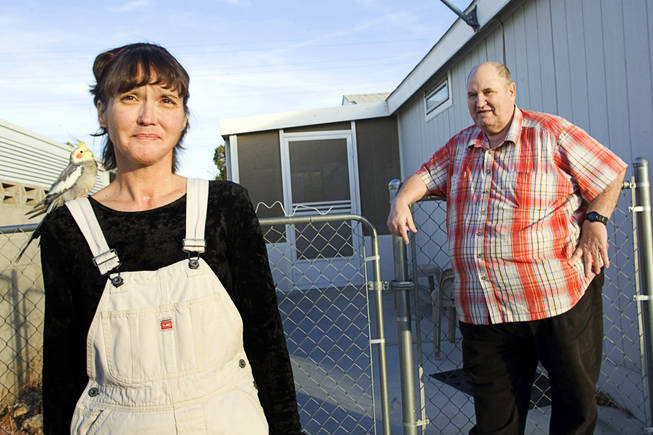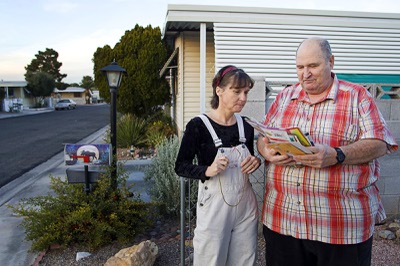
Unemployed security officer Ernie Lovitt and his wife Felecia pose at their home Tuesday, November 30, 2010. Their pet cockatiel is named “Pretty Bird.” Lovitt has been unemployed since June, he said.
Wednesday, Dec. 1, 2010 | 2 a.m.
Sun archives
- 2 million lose jobless benefits as holidays arrive (11-30-2010)
- Jobless benefits to expire as Congress debates tax (11-21-2010)
- Nevada’s jobless rate hits 14 percent, nation’s highest (6-17-2010)
- Art of the spin, unemployment-rate style (11-22-2009)
- Jobless rate leaps to 13.1 percent in Las Vegas (8-21-2009)
Three years ago, George Earnest Lovitt — Ernie to his friends — and his wife, Felecia, decided to leave their home in Arkansas to head West, and soon after, landed in Las Vegas.
He got a job guarding a Bank of America for Wackenhut security. They bought a house. It was right before the recession.
Six months ago, Lovitt lost his job. In the time since, his lender has started foreclosure proceedings on his house. Now, his safety net — in the form of unemployment checks — is about to disappear.
For Lovitt, that’s the last straw: He’s packing it up, he says, and heading back to Arkansas.
“I’ve got two more weeks and then the unemployment will go away,” Lovitt said. “We just can’t afford to stay anymore.”
Across the United States, about 2 million people are facing the same sort of expiration date: As of 12:01 a.m. today, it’s no longer possible to file for extended unemployment benefits the federal government created to help scores of unemployed deal with a bleak job market and an extended recession.
The Senate failed Tuesday to take up an emergency one-year extension offered by Finance Committee Chairman Max Baucus after Republican moderate Scott Brown objected to passing a $56.4 billion measure that wasn’t paid for by cuts elsewhere in the federal budget.
So far, the government has paid out $319 billion in extended unemployment benefits.
Tuesday’s interplay between Republicans and Democrats wasn’t much more than political theater on the eve of a holiday-season expiration. But after almost two years of repeat performances, every time unemployment benefits have come up for a renewal, it’s a plot that shows few signs of changing — even under the guise of a new, balanced Congress next year.
Because the country is eventually expected to recover from the recession, Congress has never passed anything more than a temporary authorization of benefits.
The hourglass has run out on nearly every extension over a familiar standoff: Democrats try to push unemployment benefits forward as a must-pass emergency measure — meaning the obligation to adjust the budget to accommodate the cost is waived — and the GOP digs in, refusing to lend its support until lawmakers find a way to pay for it.
“We’ve objected to these so far on funding grounds,” Republican Minority Whip Eric Cantor said Tuesday, explaining that he wasn’t philosophically opposed to helping people facing tough times, as long as the government could pay for the assistance. “But this is not helpful, to be in a permanent state of extensions.”
Despite calls “to reform unemployment insurance, including returning people to work,” GOP leaders haven’t hashed out quite how to do that. Nor have they stated whether they’ll either be better about paying for the extended benefits currently on the books, or are ready to let some of the extended assistance expire permanently.
Since 2008, the government has set up a system of up to four tiers of extended unemployment, to add to the 26 weeks of checks jobless filers are regularly guaranteed. Depending on the unemployment rate in the state where they last worked, recipients who have exhausted the first 26 weeks of unemployment benefits can apply for an additional 20, then 14, then 13, then six weeks. After that, those in especially hard-hit states, including Nevada, can apply for up to an additional 20 weeks under a fifth tier of extended benefits, for a total of 99 weeks of unemployment eligibility.
But one has to apply to graduate to the next tier of benefits. And when the Nov. 30 deadline passed, almost 2 million Americans were left with a much smaller safety net than they were expecting.
Congress set the deadline in July, when lawmakers hammered out their most recent benefits patch to keep the funding stream going, after weeks of debate over whether and how to pay for the expenditure.
Now, with unemployment rates in decline across the country — even Nevada saw its rate drop for the first time in October — it was highly unlikely that a divided Congress would accept Baucus’ proposed one-year emergency patch, a much longer and more expensive proposal than anything that has recently passed.
A more plausible vehicle may come in the form of a hybrid bill. Some Democrats are proposing linking an extension of tax cuts that were adopted under President George W. Bush in 2001 and 2003 to an extension of unemployment benefits, a combination they say could potentially “pay” for the cost of benefits by letting some tax cuts expire.
Right now, Democrats only want to extend tax cuts on the first $250,000 of household income. That’s not likely to play well with GOP members who say that extending all the tax cuts is essential to pulling the country out of recession.
“We’ve got tough times ahead of us, in terms of expenditure restraint,” said Byron Dorgan, a conservative Democratic senator from North Dakota, as he sifted through the GOP’s platform. “You hear people saying we must extend the tax cuts for the wealthiest Americans — but then we can’t extend unemployment benefits for those who are out of luck.”
But with no viable proposal on paper, it’s likely the standoff will continue for several weeks. And if unemployment benefits are tied to the timetable of tax cuts, it’s quite possible checks won’t start up again until after Christmas.
In the meantime, those like Lovitt are just out of luck.
Over the past few months, things have gotten so bad for the Lovitts they have turned to fellow church members for basics like groceries. But in a way, Lovitt is better off than most, because his check isn’t his only source of income.
After 36 years of military service, he retired with a pension of about $2,000 a month and entered the private sector, where he’s worked various security jobs across the country for the past two decades. In the past few years, he’s received Social Security benefits of about $300 a month on top of that.
But take from that about $1,100 in monthly mortgage payments, plus car payments, medical bills — his wife suffers from seizures that keep her from working, but don’t qualify for government disability benefits — and credit cards, and there’s more going out than coming in.
“I apply for jobs almost every day of the week, but still nobody’s accepting my applications,” Lovitt said.
At 73, Lovitt’s age works against him. But with no jobs or help on the horizon, he says he’ll keep downsizing — now back to the unheated, ramshackle house he owns in Arkansas — until he figures out how to recover.
“I really don’t know. I know it’s going to be a blow. And I know it’s going to be a hardship. But I’ll still be looking for work every day until the time I leave.”



Join the Discussion:
Check this out for a full explanation of our conversion to the LiveFyre commenting system and instructions on how to sign up for an account.
Full comments policy